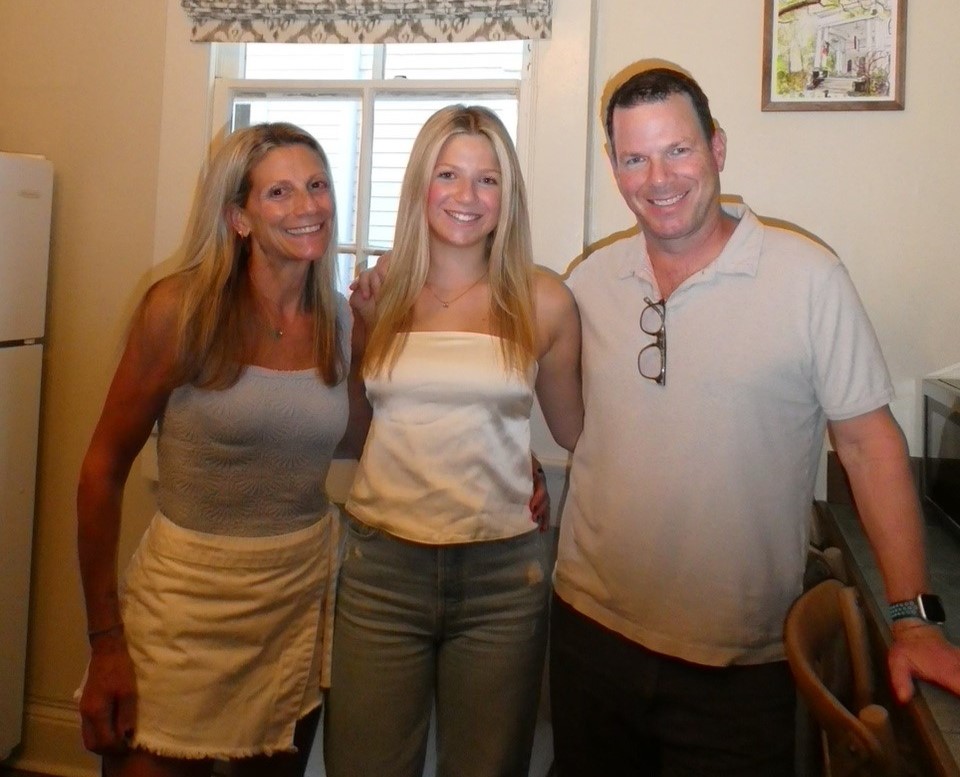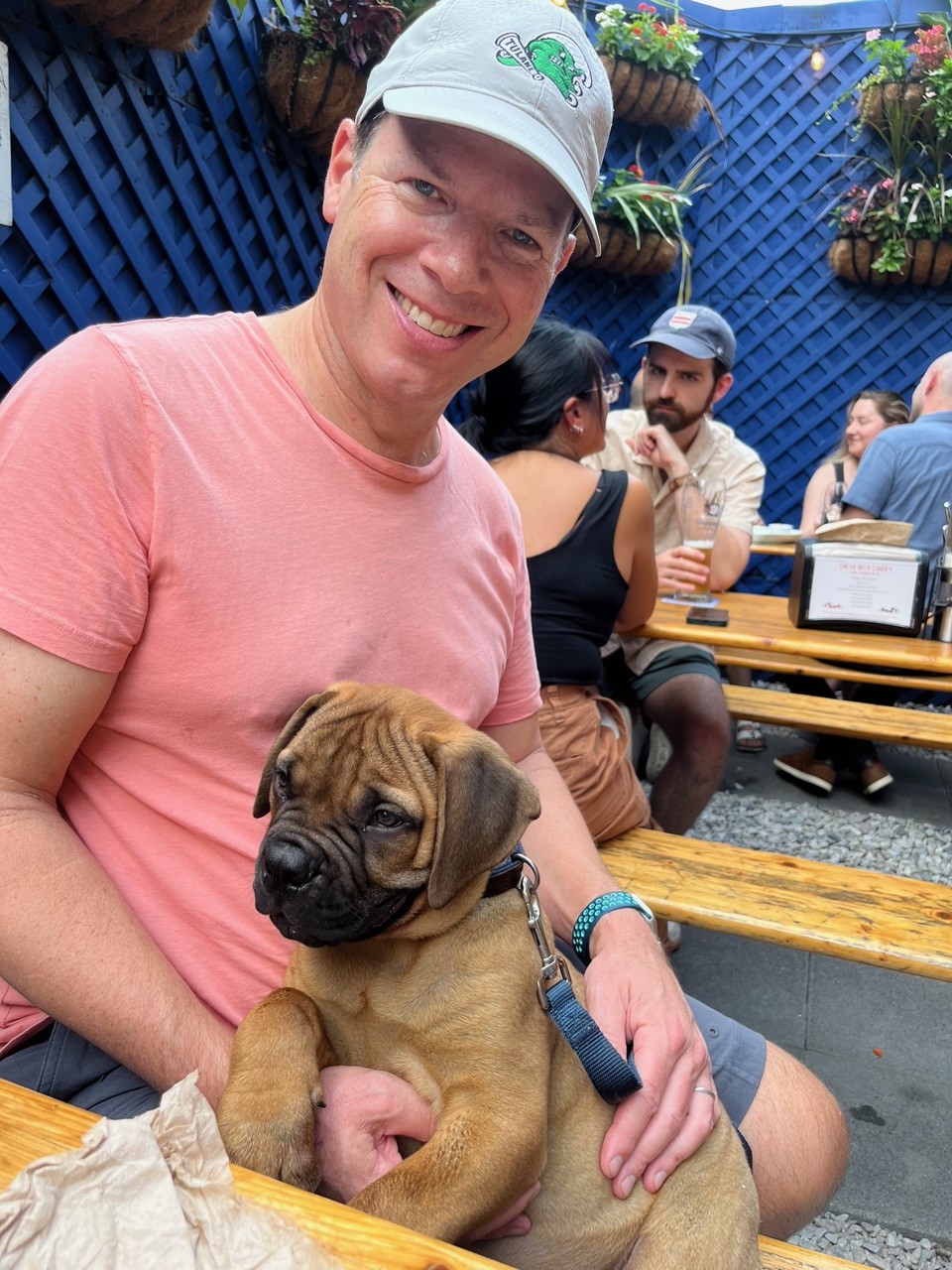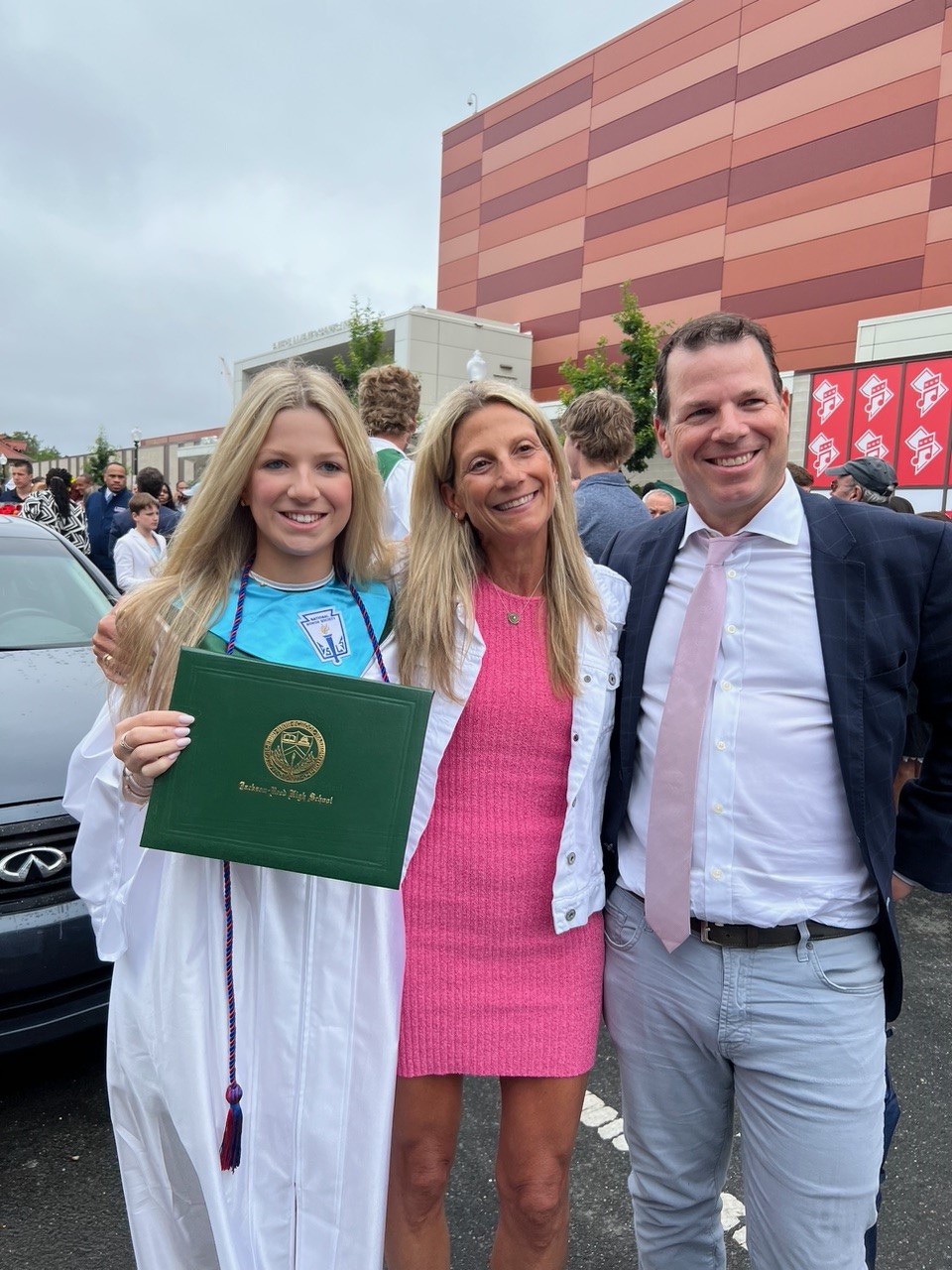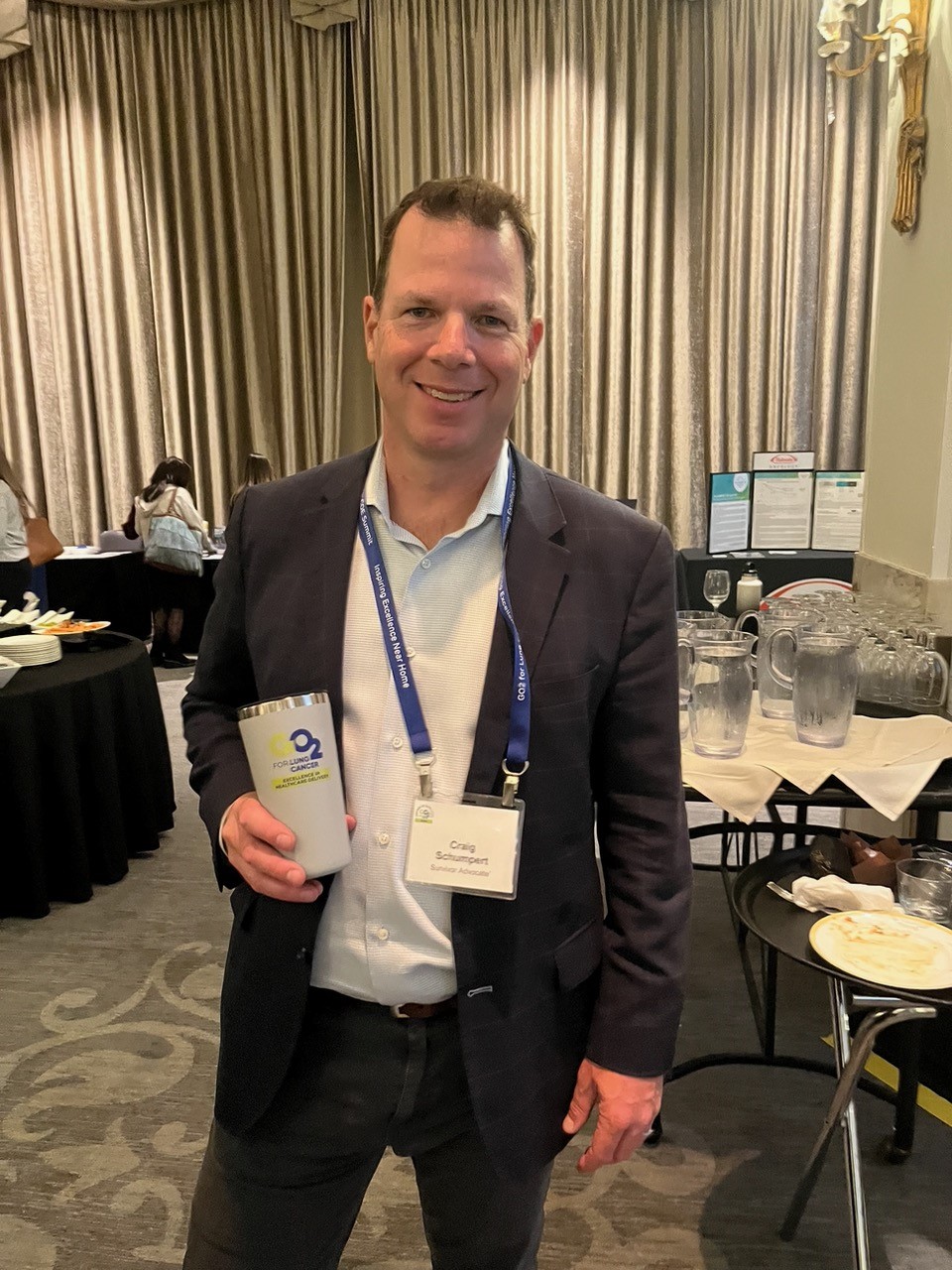Craig S. lives in Washington, D.C., with his wife, Lydia, and daughter, Lola, who is a freshman at Tulane University. He has worked in software sales and sales leadership since getting his MBA from George Washington University. He enjoys rooting for the Washington Nationals, cooking, experimenting with cocktail recipes, and spending time with his friends and family.
Early symptoms
My journey with lung cancer began innocently enough, with a persistent cough during routine six mile runs with my wife, Lydia. I would run three miles and then have to take a break to cough and cough and cough. While it was a new development, and definitely odd, I never suspected that my cough was a symptom of lung cancer. I blamed it on allergies, or on dust or pollen in the air.
I became more alarmed during what I had planned as a 30-mile bike ride in August 2019. Five miles in, I was going up a hill and I found myself breathless and needing to turn back. This was a distance I should have been able to knock out easily, having ridden my bike more than a hundred miles several times so I suspected that something was probably wrong. Ironically, I even vividly recall thinking, “If I have lung cancer, I’m going to be really pissed off.” But I certainly didn’t really think I had it.
My diagnosis
When I got home, I shared my experience with Lydia. I showed her that when I breathed in and kept breathing, breath would keep coming from my lungs involuntarily. She urged me to see a doctor. I was able to see my general practitioner the next day and he thought it could be asthma or another lung condition. He had me take a lung function test, which I failed. This made him concerned enough to take an X-ray of my chest which revealed a large mass in my left lung. I immediately thought, “Oh my God, what could that mean other than cancer?”
He then ordered me a CT scan. I was obviously very anxious to get the results, so when my doctor’s administrator sent me the report, I opened it right away and saw that it said, “metastatic lung cancer” which had spread to my lymph nodes. I was just blown away and petrified. I remembered having read somewhere that if you have lung cancer and it spreads to your lymph nodes, you can forget it. I thought I was a dead man. I then had a biopsy, which confirmed the diagnosis, and then a PET scan and an MRI. I learned that the cancer had spread to my bones and my brain.
Finding hope in an ALK+ diagnosis
From there, a good friend of ours who is a doctor helped us to do a lot of research and navigate the next steps. She recommended treatment through Johns Hopkins, and I soon met with my oncologist, Dr. Benjamin Levy. He ordered biomarker testing for me right away for both tissue and liquid biopsies.
I remember that during this time—after my diagnosis but before I learned the specifics—we went out to the Chesapeake Bay with some friends. We were sitting by the pool, listening to music, and I just started to cry. I thought, “Is this my last vacation?” and I said to Lydia, “I’m afraid of dying.”
I started radiation treatment on both my bones and brain before knowing the biopsy results. While I was waiting to receive treatment, Dr. Levy called and told me the liquid biopsy results were back and showed that I had the ALK mutation.
Lydia and I were somewhat relieved. Dr. Levy had already explained to us that there were three mutually exclusive outcomes to my testing. The first was that I could have a biomarker and receive a targeted therapy for it. The second was that I could have immunotherapy if my PDL1 levels were high enough. The third was that I could have chemotherapy if I wasn’t eligible for either of the other types of treatment.
I didn’t know anything about any of this stuff at the time, but I remember Lydia saying, “We want option number one, right?” and Dr. Levy agreeing. So, when he called and said, “I have good news—it’s ALK,” we knew this was the path we wanted to be on. Even Lydia, who had been such a rock throughout this ordeal, broke down in tears. We were so happy with this outcome.
Return to normalcy
Starting alectinib, my targeted therapy, brought us a lot of hope. The cough that had plagued me for months began to fade, and I started feeling normal again.
People are often surprised to find out how normal my life is with lung cancer. They sometimes even call me inspiring or incredible for going to work or participating in life while living with lung cancer, but I am just living my regular life. In fact, having a normal life is a good distraction. I take pills twice a day, so it’s not like I can forget I have lung cancer, but at the same time, it’s only taking pills with breakfast and dinner. It’s incredible, really. Only four pills twice a day allow me to feel good, be positive, and live a regular life.
I also must recognize Lydia’s crucial role in all of this as my partner and our emotional caregiver. She guided our family through tough conversations with our daughter, who was only a freshman in high school at the time. She also helped maintain a semblance of normalcy in our lives by continuing to do things like going out to dinner, having fun, and enjoying the little and big things.
Looking to the future
Living with lung cancer has changed the way I approach life, and I think that I’m actually a happier person post-diagnosis. I do not want to say that now I’m living every day to the fullest, although I mostly think that I am. It’s more that I now see people differently and evaluate relationships differently. I think more about where I do and do not want to spend my time and energy, and I spend more time doing the things that make me happiest. I try not to waste energy on the other stuff anymore.

I have to say, though, that I hate when people ask me what’s on my bucket list. First of all, I’m not planning on dying any time soon. Secondly, the things I want to do, like see my daughter graduate from college and participate in her wedding, are things that are important to me, that mean more time, deeper relationships, and more experiences. I don’t need to go climb Mt. Kilimanjaro. I just want more time with the people I love, like all of us do.
Research really brings me a lot of hope for the future. There is so much acceleration happening in new ways to treat lung cancer. It helps me to know that if alectinib stops working for me, there will be something else that I can try—and then another one after that. It’s amazing, and I’m impressed by the rate of advancement in lifesaving research. There are a lot of smart people out there who are doing incredible things to put this cancer to rest. I really think they are going to conquer it.




My same exact storu
I’d like to connect you Craig
Hi Cesar – I will share your contact information with Craig. Thank you for the comment. If GO2 can also offer support in any way, our HelpLine is always available to you at 1-800-298-2436 or support@go2.org.
Hi Cesar – Happy to connect. Please email me at craigschumpert@icloud.com
Wonderful to read your story Craig. My 35 year old daughter was similarly diagnosed last Sept and is on exactly the same treatment. We live in Mumbai, India and she is being treated at Dir HN Reliance Hoapital. I pray that further research finds a permanent cure. Meanwhile, this treatment has given us hope where there seemed to be none as her cancer was detected in stage 4 It would be great if you could keep me posted on any breakthroughs that come to you through your oncologist. If you can share your mail ID I can also similarly keep you posted. Also if any extraordinary advice comes up that can additionally help.
Warmest regards and with best wishes
Vaneet Chhibber
vaneet.chhibber@gmail.com
Hi Vaneet – I will share your contact information with Craig. Thank you for the comment. If GO2 can also offer support in any way, our HelpLine is always available to you at 1-800-298-2436 or support@go2.org